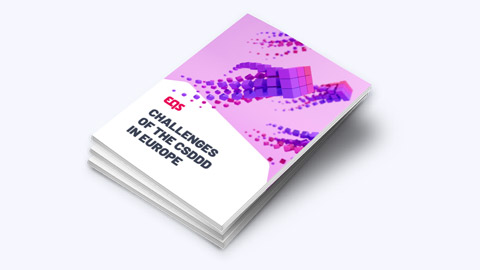Can I Trust My Organisation’s Compliance Framework?
How can a whistleblower be sure that his or her complaint will be processed with impartiality?

The development of a healthy speak-up culture is key to eliminating the psychological inhibitions potential whistleblowers face when speaking out. Unfortunately, even in organisations where employees have the option of reporting wrongdoing through a new state-of-the-art whistleblowing system, they may fail to do so due to concerns about who will process their complaint. This article examines the issue of compliance framework neutrality and how companies can reassure members of staff that investigations into their reports will be impartial.
Familiar faces, impartiality fears
In smaller organisations where every face is familiar, whistleblowers may hold back reporting their concerns, feeling that anonymity is simply impossible. Take the case of a company with 60 employees where everybody knows each other. While it does not have a dedicated compliance department, the company has taken the initiative to establish a whistleblowing system to comply with a new law while little information has been provided about how the process functions.
Employees may understandably wonder who is going to investigate their reports and whether their concerns will ultimately end up on the desk of a boss known for having a temperamental attitude. The stakes are especially high in organisations that have introduced whistleblowing systems to tick legal boxes while lacking a company environment built on trust and transparency. Sadly, criticism remains unwelcome in some organisations where retaliation against those speaking out is considered business-as-usual.
While a solid speak-up culture can produce a hero whistleblower who spoke up at an early stage to safeguard his or her organisation’s image, a poor working atmosphere will build a culture of silence among staff who fear being labelled a “rat”, “snitch” or “tattletale”, even if whistleblowing channels are in place. When employees fail to report on a scandal that has been brewing away for weeks, it can turn into a ticking time-bomb with disastrous consequences.
Compliance department neutrality
When it comes to making a whistleblowing report to an individual, through a software solution or to the compliance department, trust is fundamental. A good ethics and compliance programme has two vital components – an accessible whistleblowing system and an effective speak-up culture where reporting is encouraged and complaints are taken seriously. As more companies recognise the benefits whistleblowers bring, compliance departments have been able to build an environment of trust and transparency with the backing of senior management.
Even when all the ingredients for the perfect compliance framework are in place, can employees still be sure that key members of the compliance department can be trusted? Assurance can be provided through the introduction of mechanisms and workflows whereby selected individuals from the compliance department have access to whistleblowing reports, rather than senior management. This effectively bypasses management chains and allows all employees to blow the whistle on those working in higher positions without having to fear repercussions.
Levels of oversight can be boosted further when at least two members of the compliance team have to sign off on a whistleblowing report. When multiple individuals are involved in the process, the chances of a conflict of interest occurring are significantly reduced. The compliance department should also encourage all employees and external partners to speak up and report any threat to impartiality through the whistleblowing system. It is also important to mention that when a digital whistleblowing system is used, the software provider never has access to the reports filed which remain confidential within the client organisation.
It is essential for companies to put a comprehensive set of corporate guidelines into place, such as a Code of Conduct. Along with providing reassurance to employees, this will help the organisation address a host of negative scenarios and outline the processes necessary to restore and strengthen trust.
Outsourcing whistleblowing reports to an external entity can also ease impartiality fears given that a natural distance is maintained while disputes are resolved independently. While this approach is used by many large organisations, it also proves effective at smaller organisations, as the following section explains.
Overcoming apprehension with an impartial arbitrator
Smaller organisations frequently have to cope without the resources of a compliance department and overcoming trust barriers can prove extremely difficult in an office space where all employees know each other. In these situations, whistleblowing reports can be handed over to an external entity such as a legal firm or the ombudsman who can act as an impartial arbitrator and uphold confidentiality.
External legal firms are well equipped to handle reports while the ombudsman is often a trained lawyer. These entities can serve as a neutral and confidential intermediary between the company and the whistleblower, particularly if the latter is sceptical about the neutrality of his or her employer’s compliance framework.
Regular communication is vital for these ‘compliance referees’ to be effective and companies need to provide details of the advantages they provide and their contact information. Employees should also be regularly assured that the lawyer’s duty of confidentiality applies and that external intermediaries offer a high level of security.
Investigations: external agency or internal employees?
While the mere act of submitting a complaint can make a whistleblower fret about impartiality, similar concerns frequently arise during the investigation phase. When a workplace investigation is being conducted, both internal and external resources can be harnessed, though their use depends on the scale of the problem at hand.
When the issue is very serious, it will almost certainly require some form of external influence given that connections between people inside the organisation can make an internal investigation impossible due to inevitable conflicts of interest. In certain instances, however, external parties can be unhelpful as they do not know the business and cannot spot the important issues, a disadvantage for whistleblowers.
If whistleblowers are able to submit their concerns within an effective speak-up environment, taking the internal route can prove advantageous. Some of the best-regarded compliance officers are internal and have extensive experience within their industry. As a result, they tend to understand better how the business works, they can spot inconsistencies and they can even tell when someone is not being truthful.
Generating trust through relentless communication
“Internal whistleblowing” tends to be new territory for employees in most companies and the majority of staff are unlikely to be familiar with the term or how to air their grievances. Even when the necessary knowledge is present, staff can fear bias and avoid approaching a designated contact person. They can also prove sceptical of new compliance technologies such as a digital whistleblowing system if training or communication is absent. Unfortunately, compliance communication is an area many companies neglect, and it is key to building trust and overcoming reporting inhibitions.
Employees and other key stakeholders must be shown that speaking up serves a higher purpose by protecting the organisation and contributing to its continuation and success. Senior management should be involved in the communication process and set a strong tone-from-the-top while all messaging should be short and concise. It is crucial to reassure employees that the whistleblowing system has nothing to do with “snitching” and that it is actually designed to help eliminate wrongdoing, improve the working atmosphere and contribute to the organisation’s success.
As part of the communication strategy, the entire reporting process should be explained clearly, anonymity should be emphasised, and fears should be assuaged regarding sanctions or disadvantages. This will put employees’ minds at ease and reduce apprehension around reporting.
Conclusion
Companies need to reduce the psychological inhibitions and impartiality fears whistleblowers face through the creation of a safe speak-up environment supported by effective reporting tools and underscored with a far-reaching communication campaign. Smaller companies without a dedicated compliance team should provide employees with as many reporting options as possible, including an external channel that can be relied upon for its neutrality.
In larger organisations, communication should put a face to compliance and let employees know they can depend on a network of highly trained compliance professionals. Businesses of all sizes should also hold regular training sessions to ensure their employees understand the compliance process and the functionality of reporting tools while regular staff polls can gather important feedback for improvement. The successful implementation of these measures should significantly reduce employee concerns and create an environment where they can report cases of wrongdoing with confidence.

Key principles of establishing an effective ABC programme





